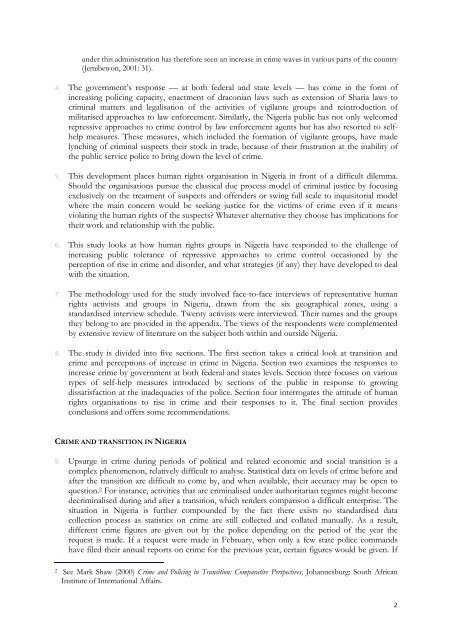114 - Nigeria - Crime and Human Rights Shettima, Kole - The ICHRP
114 - Nigeria - Crime and Human Rights Shettima, Kole - The ICHRP
114 - Nigeria - Crime and Human Rights Shettima, Kole - The ICHRP
You also want an ePaper? Increase the reach of your titles
YUMPU automatically turns print PDFs into web optimized ePapers that Google loves.
under this administration has therefore seen an increase in crime waves in various parts of the country<br />
(Jemibewon, 2001: 31).<br />
4. <strong>The</strong> government’s response — at both federal <strong>and</strong> state levels — has come in the form of<br />
increasing policing capacity, enactment of draconian laws such as extension of Sharia laws to<br />
criminal matters <strong>and</strong> legalisation of the activities of vigilante groups <strong>and</strong> reintroduction of<br />
militarised approaches to law enforcement. Similarly, the <strong>Nigeria</strong> public has not only welcomed<br />
repressive approaches to crime control by law enforcement agents but has also resorted to selfhelp<br />
measures. <strong>The</strong>se measures, which included the formation of vigilante groups, have made<br />
lynching of criminal suspects their stock in trade, because of their frustration at the inability of<br />
the public service police to bring down the level of crime.<br />
5. This development places human rights organisation in <strong>Nigeria</strong> in front of a difficult dilemma.<br />
Should the organisations pursue the classical due process model of criminal justice by focusing<br />
exclusively on the treatment of suspects <strong>and</strong> offenders or swing full scale to inquisitorial model<br />
where the main concern would be seeking justice for the victims of crime even if it means<br />
violating the human rights of the suspects? Whatever alternative they choose has implications for<br />
their work <strong>and</strong> relationship with the public.<br />
6. This study looks at how human rights groups in <strong>Nigeria</strong> have responded to the challenge of<br />
increasing public tolerance of repressive approaches to crime control occasioned by the<br />
perception of rise in crime <strong>and</strong> disorder, <strong>and</strong> what strategies (if any) they have developed to deal<br />
with the situation.<br />
7. <strong>The</strong> methodology used for the study involved face-to-face interviews of representative human<br />
rights activists <strong>and</strong> groups in <strong>Nigeria</strong>, drawn from the six geographical zones, using a<br />
st<strong>and</strong>ardised interview schedule. Twenty activists were interviewed. <strong>The</strong>ir names <strong>and</strong> the groups<br />
they belong to are provided in the appendix. <strong>The</strong> views of the respondents were complemented<br />
by extensive review of literature on the subject both within <strong>and</strong> outside <strong>Nigeria</strong>.<br />
8. <strong>The</strong> study is divided into five sections. <strong>The</strong> first section takes a critical look at transition <strong>and</strong><br />
crime <strong>and</strong> perceptions of increase in crime in <strong>Nigeria</strong>. Section two examines the responses to<br />
increase crime by government at both federal <strong>and</strong> states levels. Section three focuses on various<br />
types of self-help measures introduced by sections of the public in response to growing<br />
dissatisfaction at the inadequacies of the police. Section four interrogates the attitude of human<br />
rights organisations to rise in crime <strong>and</strong> their responses to it. <strong>The</strong> final section provides<br />
conclusions <strong>and</strong> offers some recommendations.<br />
CRIME AND TRANSITION IN NIGERIA<br />
9. Upsurge in crime during periods of political <strong>and</strong> related economic <strong>and</strong> social transition is a<br />
complex phenomenon, relatively difficult to analyse. Statistical data on levels of crime before <strong>and</strong><br />
after the transition are difficult to come by, <strong>and</strong> when available, their accuracy may be open to<br />
question. 2 For instance, activities that are criminalised under authoritarian regimes might become<br />
decriminalised during <strong>and</strong> after a transition, which renders comparison a difficult enterprise. <strong>The</strong><br />
situation in <strong>Nigeria</strong> is further compounded by the fact there exists no st<strong>and</strong>ardised data<br />
collection process as statistics on crime are still collected <strong>and</strong> collated manually. As a result,<br />
different crime figures are given out by the police depending on the period of the year the<br />
request is made. If a request were made in February, when only a few state police comm<strong>and</strong>s<br />
have filed their annual reports on crime for the previous year, certain figures would be given. If<br />
2 See Mark Shaw (2000) <strong>Crime</strong> <strong>and</strong> Policing in Transition: Comparative Perspectives, Johannesburg: South African<br />
Institute of International Affairs.<br />
2
















